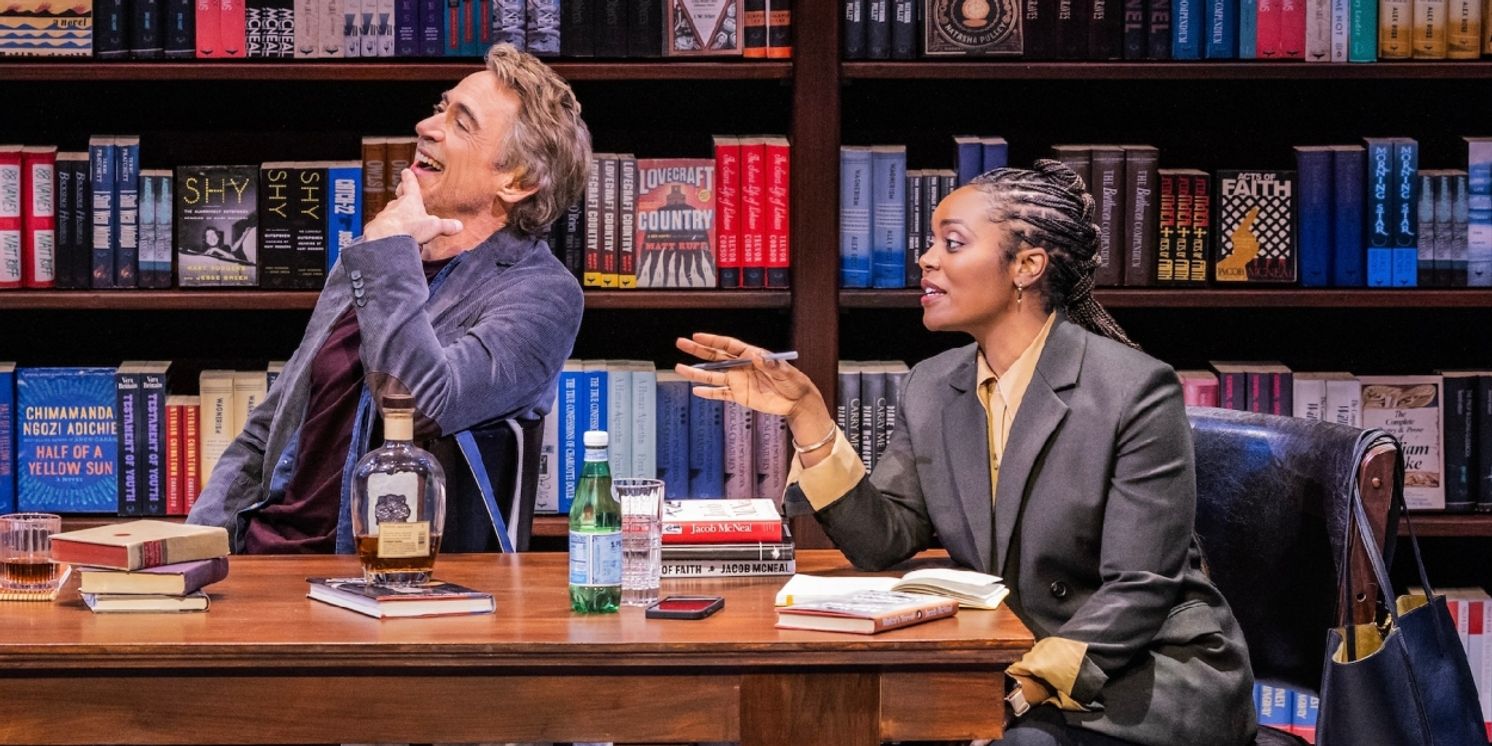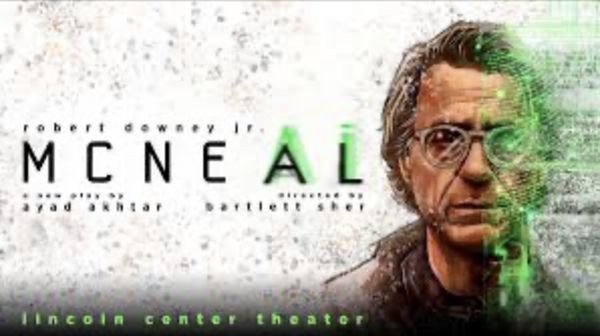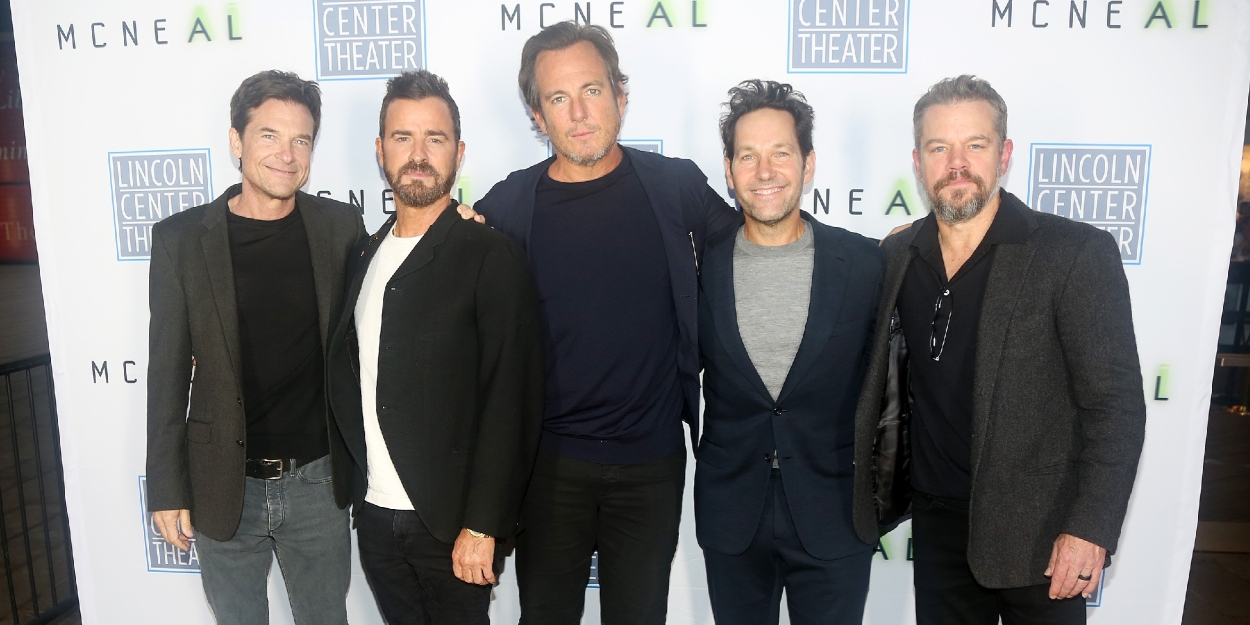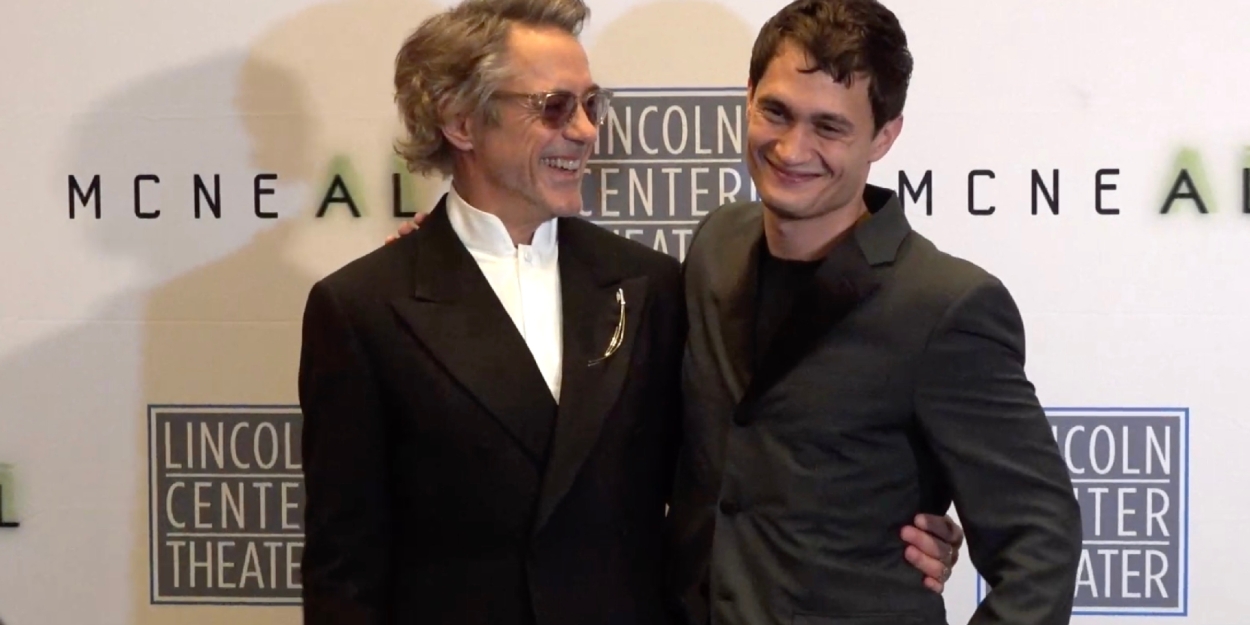Review Roundup: MCNEAL on Broadway - Robert Downey Jr. & More Star
Read all the critics' reviews for the Robert Downey Jr. led Play at Lincoln Center

Read the reviews of McNeal on Broadway from all of the critics for the new play starring Academy Award-winner and Marvel icon, Robert Downey Jr., in role of an acclaimed author obsessed by AI as he makes his Broadway debut alongside Brittany Bellizeare, Rafi Gavron, Melora Hardin, Andrea Martin, Ruthie Ann Miles, and Saisha Talwar in Lincoln Center Theater’s McNEAL, from Pulitzer Prize-winner Ayad Akhtar.
Good writers borrow, great writers steal. Jacob McNeal (Robert Downey Jr.) is a great writer, one of our greatest, a perpetual candidate for the Nobel Prize in Literature. But McNeal also has an estranged son, a new novel, old axes to grind and an unhealthy fascination with Artificial Intelligence. Pulitzer Prize-winner Ayad Akhtar’s new play is a startling and wickedly smart examination of the inescapable humanity – and increasing inhumanity – of the stories we tell.
![]() Jesse Green, The New York Times: I’m afraid, alas, the pixel wins, because the play, which opened on Monday, in a stylish Lincoln Center Theater production directed by Bartlett Sher, works only as provocation. Timely but turgid, it rarely rises to drama; in a neat recapitulation of current fears about technology, its humans, hardly credible as such, have been almost entirely replaced by ideas.
Jesse Green, The New York Times: I’m afraid, alas, the pixel wins, because the play, which opened on Monday, in a stylish Lincoln Center Theater production directed by Bartlett Sher, works only as provocation. Timely but turgid, it rarely rises to drama; in a neat recapitulation of current fears about technology, its humans, hardly credible as such, have been almost entirely replaced by ideas.
![]() Charles Isherwood, The Wall Street Journal: “McNeal,” directed by Lincoln Center Theater’s newly named executive producer Bartlett Sher, is itself a confused and discursive if thought-provoking drama that often seems a grab bag of ideas Mr. Akhtar delves into without finding much depth.
Charles Isherwood, The Wall Street Journal: “McNeal,” directed by Lincoln Center Theater’s newly named executive producer Bartlett Sher, is itself a confused and discursive if thought-provoking drama that often seems a grab bag of ideas Mr. Akhtar delves into without finding much depth.
![]() Adam Feldman, Time Out New York: Or does he? It’s hard to know. Nothing in McNeal is convincing: The characters are thin, the timelines are off, the situations are at once implausible and cliché. (When McNeal is negotiating his contract, he is shown a big number on a cell phone—barely a step up from a folded paper slid across a table.) The play’s middle scenes—McNeal’s lurid confrontation with his son (Rafi Gavron) and an off-the-rails interview with a young, Black New York Times reporter (Brittany Bellizeare)—ring utterly false, and the actors elsewhere seem flat: Andrea Martin as McNeal’s agent, Ruthie Ann Miles as his doctor, Melora Hardin as his former mistress. McNeal is the only one with any dimension, but neither his dialogue nor Downey's guarded, petulant delivery suggest the charm that others impute to him. Dressed in a writerly uniform of corduroy blazer and jeans, he’s a standard-issue manchild; the play feels a bit like spending 90 minutes with Bill Maher on a crabby day.
Adam Feldman, Time Out New York: Or does he? It’s hard to know. Nothing in McNeal is convincing: The characters are thin, the timelines are off, the situations are at once implausible and cliché. (When McNeal is negotiating his contract, he is shown a big number on a cell phone—barely a step up from a folded paper slid across a table.) The play’s middle scenes—McNeal’s lurid confrontation with his son (Rafi Gavron) and an off-the-rails interview with a young, Black New York Times reporter (Brittany Bellizeare)—ring utterly false, and the actors elsewhere seem flat: Andrea Martin as McNeal’s agent, Ruthie Ann Miles as his doctor, Melora Hardin as his former mistress. McNeal is the only one with any dimension, but neither his dialogue nor Downey's guarded, petulant delivery suggest the charm that others impute to him. Dressed in a writerly uniform of corduroy blazer and jeans, he’s a standard-issue manchild; the play feels a bit like spending 90 minutes with Bill Maher on a crabby day.
![]() Aramide Timubu, Variety: “McNeal” falters because it doesn’t know what it wants to say. Moreover, the narrative felt confusing and meaningless, with a mix of genres and no actual theme or climax. Jacob is a writer, but viewers can never penetrate who he is beyond the surface. Instead, the play becomes an illustration of a self-absorbed man who treats the people around him like accessories for his own gain.
Aramide Timubu, Variety: “McNeal” falters because it doesn’t know what it wants to say. Moreover, the narrative felt confusing and meaningless, with a mix of genres and no actual theme or climax. Jacob is a writer, but viewers can never penetrate who he is beyond the surface. Instead, the play becomes an illustration of a self-absorbed man who treats the people around him like accessories for his own gain.
![]() Robert Hofler, The Wrap: Bartlett Sher directs and he pushes each of these supporting players to overact to the extreme, while Downey Jr. delivers an oddly staccato performance. It’s as if he’s trying to distance himself from the character with his tick-filled delivery of the lines. However, as this 90-minute play progresses with its over-the-top performances from the supporting actors, Downey Jr. begins to emerge as the calm eye of the angry storm raging around his character. He wins our sympathy by default.
Robert Hofler, The Wrap: Bartlett Sher directs and he pushes each of these supporting players to overact to the extreme, while Downey Jr. delivers an oddly staccato performance. It’s as if he’s trying to distance himself from the character with his tick-filled delivery of the lines. However, as this 90-minute play progresses with its over-the-top performances from the supporting actors, Downey Jr. begins to emerge as the calm eye of the angry storm raging around his character. He wins our sympathy by default.
![]() Jeremy Gerard, Deadline: With much 21st Century razzle dazzle provided by the magnificent video projection designs of Jake Barton and huge digital composite images – video AI projections of faces of the actors meld into one another at one point – from AGBO, McNeal, astutely directed by the great Bartlett Sher, is an often confusing though wheedlingly emotional mindgame. The discombobulation is, one suspects, Akhtar’s intention, a way of presenting on a physical stage a near-future realm of thorny, magic-seeming complexity in which thousands of years of data – from Shakespeare and Ibsen to your dead wife’s old notebooks, and everything in between – can be melded into a book with your name on it, and in relative minutes. Is this theft, or merely a literary Moog waiting for its Brian Eno?
Jeremy Gerard, Deadline: With much 21st Century razzle dazzle provided by the magnificent video projection designs of Jake Barton and huge digital composite images – video AI projections of faces of the actors meld into one another at one point – from AGBO, McNeal, astutely directed by the great Bartlett Sher, is an often confusing though wheedlingly emotional mindgame. The discombobulation is, one suspects, Akhtar’s intention, a way of presenting on a physical stage a near-future realm of thorny, magic-seeming complexity in which thousands of years of data – from Shakespeare and Ibsen to your dead wife’s old notebooks, and everything in between – can be melded into a book with your name on it, and in relative minutes. Is this theft, or merely a literary Moog waiting for its Brian Eno?
![]() Patrick Ryan, USA Today: “McNeal” commits the cardinal sin of wasting Broadway treasures Andrea Martin and Ruthie Ann Miles, who pop in briefly as Jacob’s frenzied agent and concerned doctor, respectively. More ironically, it’s exactly the type of play that Downey’s smug title character would claim to deplore: all empty provocations and not an ounce of soul.
Patrick Ryan, USA Today: “McNeal” commits the cardinal sin of wasting Broadway treasures Andrea Martin and Ruthie Ann Miles, who pop in briefly as Jacob’s frenzied agent and concerned doctor, respectively. More ironically, it’s exactly the type of play that Downey’s smug title character would claim to deplore: all empty provocations and not an ounce of soul.
![]() Johnny Oleksinki, The New York Post: Should your sole aim be to watch the Marvel and “Oppenheimer” actor, who’s making his Broadway debut, give a capable performance in his signature Tony Stark staccato, mission accomplished. However, it is, well, a marvel how even the most blinding star power can dim when blacked out by a mind-numbing plot, mouthpiece supporting characters and a Universal Studios-scale set of giant screens that’s an expensive apology for the actual play.
Johnny Oleksinki, The New York Post: Should your sole aim be to watch the Marvel and “Oppenheimer” actor, who’s making his Broadway debut, give a capable performance in his signature Tony Stark staccato, mission accomplished. However, it is, well, a marvel how even the most blinding star power can dim when blacked out by a mind-numbing plot, mouthpiece supporting characters and a Universal Studios-scale set of giant screens that’s an expensive apology for the actual play.
![]() Jackson McHenry, Vulture: McNeal’s woozy ruminations about art and technology might strike with more force if the actual drama around them had more tensile strength. The human dynamics Akhtar and Sher hang all of this on never get past cliché: McNeal confronts a cadre of women, including Martin’s assistant (Saisha Talwar), a horrifyingly underprepared magazine journalist (Brittany Bellizeare), and a former New York Times books editor who is pretty obviously based on Pamela Paul (Melora Hardin). In his exchanges with them, they get to do little except absorb his rants about everything from the work of Annie Ernaux to Harvey Weinstein. If McNeal wants to tell us that a great artist — specifically a great man, in this case — is some unique force in the universe, it requires a more finely crafted rendering of that man. But on the opposite end, if the play wants to suggest AI could offer an alternative to that figure that’s equal in stature? Well, there’s an issue of rendering there, too.
Jackson McHenry, Vulture: McNeal’s woozy ruminations about art and technology might strike with more force if the actual drama around them had more tensile strength. The human dynamics Akhtar and Sher hang all of this on never get past cliché: McNeal confronts a cadre of women, including Martin’s assistant (Saisha Talwar), a horrifyingly underprepared magazine journalist (Brittany Bellizeare), and a former New York Times books editor who is pretty obviously based on Pamela Paul (Melora Hardin). In his exchanges with them, they get to do little except absorb his rants about everything from the work of Annie Ernaux to Harvey Weinstein. If McNeal wants to tell us that a great artist — specifically a great man, in this case — is some unique force in the universe, it requires a more finely crafted rendering of that man. But on the opposite end, if the play wants to suggest AI could offer an alternative to that figure that’s equal in stature? Well, there’s an issue of rendering there, too.
![]() Chris Jones, Chicago Tribune: Akhtar (“Disgraced”) is a skilled scribe, best when he works in taut situations with characters facing imminent crises of the soul. There are glimpses of that here in the best bits. As counterintuitive as it may seem, and it’s certainly contrary to the instructions in the script, I think “McNeal” would work best in a smaller production where the humans and the technology are scaled to what feels like a fairer fight. As unfair as it may actually be in the future. This is still the live theater.
Chris Jones, Chicago Tribune: Akhtar (“Disgraced”) is a skilled scribe, best when he works in taut situations with characters facing imminent crises of the soul. There are glimpses of that here in the best bits. As counterintuitive as it may seem, and it’s certainly contrary to the instructions in the script, I think “McNeal” would work best in a smaller production where the humans and the technology are scaled to what feels like a fairer fight. As unfair as it may actually be in the future. This is still the live theater.
![]() Naveen Kumar, The Washington Post: But there’s a funny irony here: Celebrity vehicles about hot topics are proven Broadway cash cows, so isn’t “McNeal” itself the product of a predictive algorithm? Even if that’s some part of a meta point, the show is nevertheless a bloodless and convoluted mess.
Naveen Kumar, The Washington Post: But there’s a funny irony here: Celebrity vehicles about hot topics are proven Broadway cash cows, so isn’t “McNeal” itself the product of a predictive algorithm? Even if that’s some part of a meta point, the show is nevertheless a bloodless and convoluted mess.
![]() Emlyn Travis, Entertainment Weekly: McNeal might ask fascinating questions about a writer’s sense of integrity, the disconnect between generations of writers, and the limits of artificial intelligence within art, but the delivery is so garbled that it is difficult to ascertain what the play is actually trying to say about these complex issues… if anything at all. Grade: C+
Emlyn Travis, Entertainment Weekly: McNeal might ask fascinating questions about a writer’s sense of integrity, the disconnect between generations of writers, and the limits of artificial intelligence within art, but the delivery is so garbled that it is difficult to ascertain what the play is actually trying to say about these complex issues… if anything at all. Grade: C+
![]() Lane Williamson, The Stage: That doesn’t make for a particularly dynamic play; aside from long conversations, nothing happens. McNeal doesn’t emerge at the end of the play having experienced a change for better or worse. None of the characters reach a new connection with him. It’s unresolved, empty and pointless – just an opportunity to see a movie star on stage.
Lane Williamson, The Stage: That doesn’t make for a particularly dynamic play; aside from long conversations, nothing happens. McNeal doesn’t emerge at the end of the play having experienced a change for better or worse. None of the characters reach a new connection with him. It’s unresolved, empty and pointless – just an opportunity to see a movie star on stage.
![]() Charles McNulty, The Los Angeles Times: Akhtar reanimates this dialectical discussion of artistic freedom in the fraught context of AI. The problem is that the play is overwhelmed with ideas, themes and talking points. “McNeal” is swirling with things to say about literature — how it’s created, where it gets its value and why its truth can be so dangerous — but it’s as if ChatGPT had been asked to spit out the pros and cons of advanced technology on the practice of literature. The human story gets lost in the shuffle.
Charles McNulty, The Los Angeles Times: Akhtar reanimates this dialectical discussion of artistic freedom in the fraught context of AI. The problem is that the play is overwhelmed with ideas, themes and talking points. “McNeal” is swirling with things to say about literature — how it’s created, where it gets its value and why its truth can be so dangerous — but it’s as if ChatGPT had been asked to spit out the pros and cons of advanced technology on the practice of literature. The human story gets lost in the shuffle.
![]() Dan Rubins, Slant Magazine: The technology distracts from the real human drama that McNeal depicts, and the seriousness of that drama dilutes any coherent argument about the impact of machine language models on literature or life. And, no, that lack of clarity cannot be explained by Akhtar using A.I. himself in creating the text, as he insists that all the words are his alone. The hollow McNeal, after all, is only halfway to presenting as artificial intelligence. It’s got the artificial part down pat.
Dan Rubins, Slant Magazine: The technology distracts from the real human drama that McNeal depicts, and the seriousness of that drama dilutes any coherent argument about the impact of machine language models on literature or life. And, no, that lack of clarity cannot be explained by Akhtar using A.I. himself in creating the text, as he insists that all the words are his alone. The hollow McNeal, after all, is only halfway to presenting as artificial intelligence. It’s got the artificial part down pat.
![]() Frank Scheck, New York Stage Review: Star power is not to be underestimated. Not only can it bring in audiences who may not normally attend new Broadway plays, it can also infuse a problematic work with a gravitas it might not normally possess. Such is the case with Lincoln Center Theater’s production of the new drama by Ayad Akhtar (Disgraced, The Invisible Hand) that touches on such themes as artificial intelligence, plagiarism, and writerly inspiration without really coming to grips with any of them. But it doesn’t matter, thanks to the presence of Robert Downey Jr. in the title role. Downey, who recently won an Oscar for the film Oppenheimer and is here making his stage debut, brings such charisma and magnetism to McNeal that it’s easy to overlook the play’s flaws.
Frank Scheck, New York Stage Review: Star power is not to be underestimated. Not only can it bring in audiences who may not normally attend new Broadway plays, it can also infuse a problematic work with a gravitas it might not normally possess. Such is the case with Lincoln Center Theater’s production of the new drama by Ayad Akhtar (Disgraced, The Invisible Hand) that touches on such themes as artificial intelligence, plagiarism, and writerly inspiration without really coming to grips with any of them. But it doesn’t matter, thanks to the presence of Robert Downey Jr. in the title role. Downey, who recently won an Oscar for the film Oppenheimer and is here making his stage debut, brings such charisma and magnetism to McNeal that it’s easy to overlook the play’s flaws.
![]() Roma Torre, New York Stage Review: Before I get into the merits of the play and Lincoln Center’s thrilling production, something else that’s very real is the extraordinary talents of its leading man. Making his Broadway debut, Robert Downey Jr., who most of us know only through his film work, is a great stage actor. As famed novelist Jacob McNeal, an egotistical, self-acknowledged asshole, he is a fascinating creature treading the line between obnoxious and seductive. You can’t take your eyes off him…and happily, he’s on stage for the entirety of Akhtar’s 90-minute drama.
Roma Torre, New York Stage Review: Before I get into the merits of the play and Lincoln Center’s thrilling production, something else that’s very real is the extraordinary talents of its leading man. Making his Broadway debut, Robert Downey Jr., who most of us know only through his film work, is a great stage actor. As famed novelist Jacob McNeal, an egotistical, self-acknowledged asshole, he is a fascinating creature treading the line between obnoxious and seductive. You can’t take your eyes off him…and happily, he’s on stage for the entirety of Akhtar’s 90-minute drama.
![]() Jonathan Mandell, New York Theater: “McNeal” is a great showcase for Robert Downey Jr., making his Broadway debut as the novelist Jacob McNeal, who is unraveling just at the moment of his greatest acclaim. But Downey also seems a vehicle by which playwright Ayad Akhtar attempts to address some age-old questions about the creative process, with a new twist:
Jonathan Mandell, New York Theater: “McNeal” is a great showcase for Robert Downey Jr., making his Broadway debut as the novelist Jacob McNeal, who is unraveling just at the moment of his greatest acclaim. But Downey also seems a vehicle by which playwright Ayad Akhtar attempts to address some age-old questions about the creative process, with a new twist:
![]() Joe Dziemianowicz, New York Theatre Guide: In Ayad Akhtar’s crisply staged yet dramatically muddy play, McNeal, Oscar winner Robert Downey Jr. summons every ounce of his innate swagger and smugness as a misogynistic author who’s just found himself the recipient of the Nobel Prize for Literature. In his Broadway debut, Downey steps up; he’s sure-footed and magnetic. The play itself, less so.
Joe Dziemianowicz, New York Theatre Guide: In Ayad Akhtar’s crisply staged yet dramatically muddy play, McNeal, Oscar winner Robert Downey Jr. summons every ounce of his innate swagger and smugness as a misogynistic author who’s just found himself the recipient of the Nobel Prize for Literature. In his Broadway debut, Downey steps up; he’s sure-footed and magnetic. The play itself, less so.
![]() Juan A. Ramirez, Theatrely: Downey, though lacking in stagecraft and more or less acting from beat to beat, is not without merit. He embodies the self-important asshole-yness of a 20th century literary giant with ease, and could likely have crafted a more memorable character had he been written a meatier role. But his McNeal is as wandering and ineffective as the play itself. Akhtar, whose work has always existed in the liminality between tradition and vanguard, is here lost in the slop. McNeal, the character, doesn’t land on any side of the “Is AI good for art, or killing it?” divide, instead treating it with the safe curiosity of a successful man with little to lose in his later years. (I must here grudgingly point to a titan like David Lynch archly commenting on Donald Trump’s value in waking up the national consciousness a few years back.) That’s interesting. But Akhtar does not explore that, attacking the personal choices, rather than the possible ideologies, of his largely archetypal character. McNeal, the play, therefore comes and goes; a mild thumbnail in a growing pile of decreasingly worthwhile content, featuring artists and themes we know and love, borne back ceaselessly into the archive.
Juan A. Ramirez, Theatrely: Downey, though lacking in stagecraft and more or less acting from beat to beat, is not without merit. He embodies the self-important asshole-yness of a 20th century literary giant with ease, and could likely have crafted a more memorable character had he been written a meatier role. But his McNeal is as wandering and ineffective as the play itself. Akhtar, whose work has always existed in the liminality between tradition and vanguard, is here lost in the slop. McNeal, the character, doesn’t land on any side of the “Is AI good for art, or killing it?” divide, instead treating it with the safe curiosity of a successful man with little to lose in his later years. (I must here grudgingly point to a titan like David Lynch archly commenting on Donald Trump’s value in waking up the national consciousness a few years back.) That’s interesting. But Akhtar does not explore that, attacking the personal choices, rather than the possible ideologies, of his largely archetypal character. McNeal, the play, therefore comes and goes; a mild thumbnail in a growing pile of decreasingly worthwhile content, featuring artists and themes we know and love, borne back ceaselessly into the archive.
Average Rating: 41.0%
- To read more reviews, click here!
- Discuss the show on the BroadwayWorld Forum
Reader Reviews

|
Powered by
|
Videos






